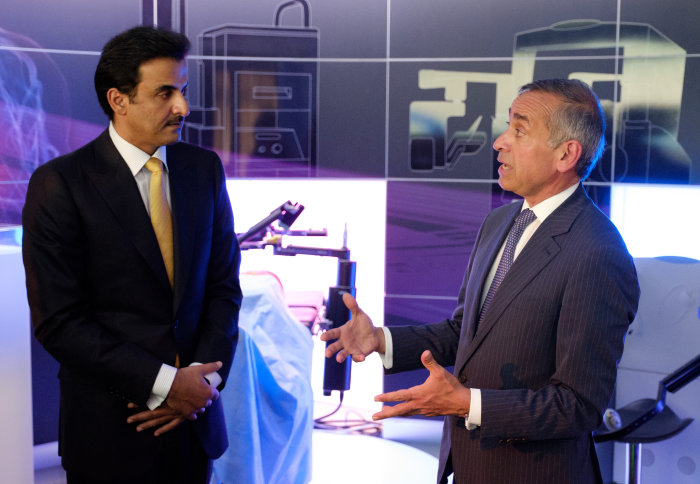Emir of Qatar discusses health innovation during Imperial visit

The Emir of Qatar Sheikh Tamim Bin Hamad Al Thani visited Imperial College London and met with Lord Darzi to discuss the latest health innovations.
The Emir of Qatar with members of his cabinet including Her Excellency Dr Hanan Al Kuwari, The Minister of Public Health, toured the Institute of Global Health Innovation’s Hamlyn Centre – where Professor the Lord Darzi of Denham demonstrated some of the latest surgical robotics.
A delegation from Qatar, Alistair Burt Minister of State for the Middle East at the Foreign and Commonwealth Office and Minister of State at the Department for International Development, Caroline Dineage, the Minister of State at the Department of Health and Chief Medical Officer Dame Sally Davies also attended the visit.

Lord Darzi explained the Hamlyn Centre’s role as a champion for technological innovation and clinical adoption of minimally invasive surgery and allied technologies including robotics, and its ongoing role in research on the development robotic surgery, imaging and sensing.
The Emir of Qatar was interested in how successful the technology was and what type of operations it was used for.
Lord Darzi said it was proving very successful, with an increasing portfolio of operations that it is now being used for. The robot is most commonly used in cancer surgery, such as prostate and bowel surgery, but also in minimally invasive cardiac surgery, gynaecological and head and neck surgery.

The Emir of Qatar asked whether doctors and surgeons needed a different type of training if they intended to go into robotic surgery.
Lord Darzi said that these are new skills and people require specific training which has been developed, similarly to airline pilots learning to fly a different type of aircraft.
Machine Learning

Lord Darzi then explained that machine learning and artificial intelligence in healthcare was a research priority in the UK – but relied on access to data.
Dr Alan Karthikesalingam, from DeepMind, explained how they are working with Imperial to develop an algorithm which can accurately detect breast cancer from mammogram images.
Lord Darzi said that they expect the algorithm, which needs to learn from thousands of images, to be able to detect signs of breast cancer as accurately as a radiologist.

The Emir of Qatar also saw presentations from global charity Orbis who are working to prevent and treat blindness, and the World Innovation Summit for Health (WISH), which partners with the Qatar Foundation.
The tour was followed by a round-table discussion, which saw senior figures discuss shared health challenges that are faced by Qatar and the UK, such as the increasing burden of diabetes with Dame Sally Davies leading on public health measures which have been introduced in the UK, such as the recently introduced sugar tax.
Qatar connections
Imperial has several links with Qatar including the Qatar Carbonates & Carbon Storage Research Centre (QCCSRC) which aims to advance our understanding of carbonate reservoirs, addressing challenges that include CCS, enhanced oil recovery (EOR) and producing clean fossil fuels.
Imperial is also a partner of the Qatar Biobank, opened in 2015, in partnership with the Qatar Foundation. The centre collects biological samples and data from tens of thousands of Qatari residents to enable large-scale research into the causes of disease.
Imperial were also involved in launching the Qatar Robotics Surgery Centre. Imperial has worked with Qatar Science & Technology Park since 2007 to establish the Centre.

Imperial has 13 Qatari students and a recent graduate, Dr Ali Al-Menhali, who did his PhD through QCCSRC, recently won a prestigious prize.
Dr Al-Menhali, who returned to Qatar after his PhD to work for Qatar Petroleum, one of QCCSRC’s sponsors, was awarded the Scientific Excellence Award by the Emir of Qatar for top PhD degree holder during Education Excellence Day.
The award is the highest and most important academic honour in Qatar and the award recognises outstanding research scholars, teachers, students and education institutions.
Article text (excluding photos or graphics) © Imperial College London.
Photos and graphics subject to third party copyright used with permission or © Imperial College London.
Reporter
Stephen Johns
Communications Division